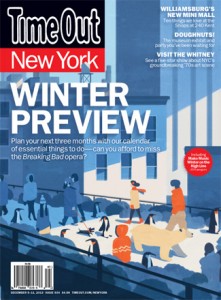Sung Jin Hong‘s Breaking Bad — Ozymandias was featured on the cover of Time Out New York magazine (December 5–11, 2013) as a part of its 2014 Winter Preview – “Your Perfect Winter.” Kenny Herzog interviewed composer-conductor Sung Jin Hong about One World Symphony’s world premiere performances of his mini-opera on January 26–27, 2014.
Author Archives: Brenda Milcik
Sundeep Mullangi ’97 Shares His Vision for the Alumni Association
Sundeep Mullangi is featured in the Fall 2013 IWU Magazine as the New Alumni Association Board of Directors President. To find out more about Sundeep’s vision for the Alumni Association you can click here.
Daniel Kelly ’97 Publishes Book
Daniel Kelly ’97 discusses the character and evolution of disgust in his book Yuck! The Nature and Moral Significance of Disgust (MIT Press), taking the reader on a journey from understanding why humans naturally avoid rot and toxic foods to the question of why we avoid certain people. Now an associate professor of philosophy at Purdue University, Kelly became interested in the topic, in part, after a conversation with his graduate adviser over a Chinatown meal of blood tofu and duck tongue soup. His adviser savored the food; Kelly, not so much.
Kelly drew from numerous disciplines – from cognitive neuroscience to normative ethics – to explore the emotion. Disgust was formed from two previously distinct psychological systems, according to Kelly. One system was designed to protect humans against consuming poisonous foods, and the other was designed to protect against catching infectious diseases. These two systems have fused into what is now recognized as a single emotion, according to Kelly.
Kelly’s interest in philosophy hearkens back to his first year at Illinois Wesleyan. “I came to Wesleyan as a computer science major, and one of the things that was so great was that I had a chance to take classes in topics I was genuinely interested in,” Kelly recalled. An introductory philosophy class resonated with Kelly, who eventually double majored in philosophy and English literature.
“At Wesleyan you could engage in the frank discussion of ideas, and professors were very much a part of creating that environment,” Kelly added. “It was a real joy to be able to argue with friends about things ranging from Hamlet’s soliloquies to scientific realism to the best Beatles album – and a lot of those conversations continue intermittently today.”
Yuck! grew out of Kelly’s dissertation at Rutgers University, where he earned a Ph.D. in philosophy in 2007. “The project provided a perfect opportunity to do important philosophical work, weaving together the conceptual resources of several different approaches to explaining the operation and evolution of human cognition,” said Kelly.



